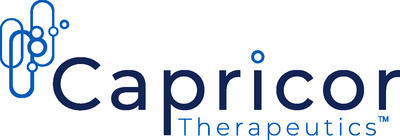Capricor Receives Rare Pediatric Disease Designation From FDA For CAP-1002 For Patients With Duchenne Muscular Dystrophy
LOS ANGELES, July 18, 2017 /PRNewswire/ -- Capricor Therapeutics, Inc. (NASDAQ: CAPR), a biotechnology company developing biological therapies for Duchenne muscular dystrophy and other rare diseases, today announced that the U.S. Food and Drug Administration (FDA) has granted Rare Pediatric Disease Designation to CAP-1002, Capricor's development candidate for the treatment of Duchenne muscular dystrophy, a debilitating genetic disorder characterized by progressive weakness and chronic inflammation of skeletal, heart, and respiratory muscles. The Rare Pediatric Disease Designation, as well as the Orphan Drug Designation previously granted to CAP-1002 by the FDA, covers the broad treatment of DMD. Upon receiving market approval for CAP-1002 by the FDA, Capricor would be eligible to receive a Priority Review Voucher.
"The Rare Pediatric Disease Designation adds to our previous Orphan Drug Designation for CAP-1002 for the treatment of Duchenne muscular dystrophy, which together underscore the urgent need for treatment options for this devastating rare disease as well as provide Capricor with certain incentives for their development," said Linda Marbán, Ph.D., Capricor's president and chief executive officer. "We believe CAP-1002 has the potential to provide meaningful clinical benefit to patients. We look forward to commencing our next clinical trial in DMD, for which design will be relevant to the overall registration plan for this candidate."
In April 2017, Capricor announced positive results from its Phase I/II HOPE clinical trial of CAP-1002 in DMD patients with advanced disease. The company recently met with the FDA to discuss potential product registration strategies for this indication, and Capricor plans to commence a randomized, double-blind, placebo-controlled clinical trial of intravenous, repeat-dose CAP-1002 in boys and young men with Duchenne in the second half of this year, subject to regulatory approval.
Capricor expects to report 12-month results from the HOPE Trial in the fourth quarter of 2017.
The HOPE Trial is funded in part by the California Institute for Regenerative Medicine.
About Rare Pediatric Disease Designation
The FDA defines a "rare pediatric disease" as a serious or life-threatening disease affecting individuals primarily aged from birth to 18 years and that affects fewer than 200,000 individuals in the U.S. Under the FDA's Rare Pediatric Disease Priority Review Voucher program, upon the approval of a qualifying new drug application (NDA) or biologics license application (BLA) for the treatment of a rare pediatric disease, the sponsor of such application would be eligible for a Rare Pediatric Disease Priority Review Voucher that can be used to obtain priority review for a subsequent NDA or BLA. The Priority Review Voucher may be sold or transferred an unlimited number of times.
About CAP-1002
CAP-1002 consists of allogeneic cardiosphere-derived cells, or CDCs, a type of progenitor cell that has been shown to exert potent immuno-modulatory activity. CDCs have been the subject of over 100 peer-reviewed scientific publications and have been administered to approximately 140 human subjects across several clinical trials.
About Duchenne Muscular Dystrophy
DMD is a genetic disorder characterized by progressive muscle degeneration and weakness. It is caused by an abnormality in the dystrophin complex, a structural element that plays a critical role in muscle fiber integrity, which leads to chronic muscle damage. Patients with DMD typically die in their twenties, most commonly due to heart disease. The incidence of DMD is estimated to be one in every 3,600 live male births, and DMD is believed to afflict approximately 15,000 to 20,000 boys and young men in the U.S.
About Capricor Therapeutics
Capricor Therapeutics, Inc. (NASDAQ: CAPR) is a clinical-stage biotechnology company developing first-in-class biological therapies. Capricor's lead candidate, CAP-1002, is a cell-based candidate currently in clinical development for the treatment of Duchenne muscular dystrophy. Capricor is exploring the potential of CAP-2003, a cell-free, exosome-based candidate, to treat a variety of disorders. For more information, visit www.capricor.com.
Cautionary Note Regarding Forward-Looking Statements
Statements in this press release regarding the efficacy, safety, and intended utilization of Capricor's product candidates; the initiation, conduct, size, timing and results of discovery efforts and clinical trials; the pace of enrollment of clinical trials; plans regarding regulatory filings, future research and clinical trials; the timing of regulatory approvals; plans regarding current and future collaborative activities and the ownership of commercial rights; scope, duration, validity and enforceability of intellectual property rights; future royalty streams, expectations with respect to the expected use of proceeds from the recently completed offerings and the anticipated effects of the offerings, and any other statements about Capricor's management team's future expectations, beliefs, goals, plans or prospects constitute forward-looking statements within the meaning of the Private Securities Litigation Reform Act of 1995. Any statements that are not statements of historical fact (including statements containing the words "believes," "plans," "could," "anticipates," "expects," "estimates," "should," "target," "will," "would" and similar expressions) should also be considered to be forward-looking statements. There are a number of important factors that could cause actual results or events to differ materially from those indicated by such forward-looking statements. More information about these and other risks that may impact Capricor's business is set forth in Capricor's Annual Report on Form 10-K for the year ended December 31, 2016 as filed with the Securities and Exchange Commission on March 16, 2017, in its Registration Statement on Form S-3, as filed with the Securities and Exchange Commission on September 28, 2015, together with prospectus supplements thereto, and in its Quarterly Report on Form 10-Q for the quarter ended March 31, 2017, as filed with the Securities and Exchange Commission on May 15, 2017. All forward-looking statements in this press release are based on information available to Capricor as of the date hereof, and Capricor assumes no obligation to update these forward-looking statements.
CAP-1002 is an Investigational New Drug and is not approved for any indications. Capricor's exosomes technology, including CAP-2003, has not yet been approved for clinical investigation.
For more information, please contact:
AJ Bergmann, Vice President of Finance
+1-310-358-3200
abergmann@capricor.com

View original content with multimedia:http://www.prnewswire.com/news-releases/capricor-receives-rare-pediatric-disease-designation-from-fda-for-cap-1002-for-patients-with-duchenne-muscular-dystrophy-300489601.html
SOURCE Capricor Therapeutics, Inc.

